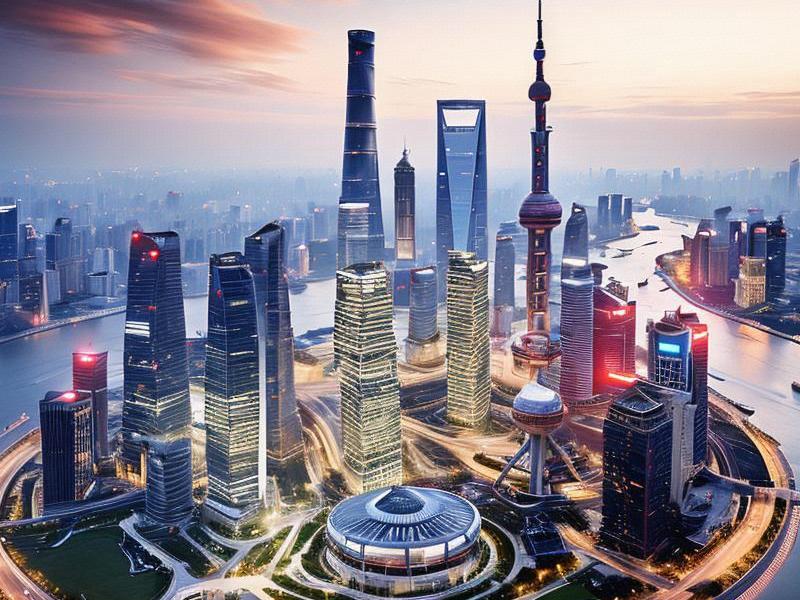
Shanghai, the bustling metropolis on the banks of the Huangpu River, has long been a symbol of China's economic prowess. Over the past few decades, it has not only solidified its position as a global financial center but has also emerged as a beacon of innovation and technological advancement. This transformation is a testament to the city's commitment to fostering a dynamic environment that attracts talent, encourages entrepreneurship, and drives technological progress.
The journey of Shanghai towards becoming a global innovation hub is multifaceted, involving significant investments in infrastructure, education, and research. The city has strategically positioned itself at the crossroads of tradition and modernity, blending its rich cultural heritage with cutting-edge technology to crteeaa unique ecosystem that fosters innovation.
One of the key pillars of Shanghai's innovation strategy is its focus on high-tech industries. The city has established numerous technology parks and innovation clusters, such as Zhangjiang Hi-Tech Park and漕河泾新兴技术开发区 (Chuancheng New Technology Development Zone). These hubs have become incubators for startups and research institutions, fostering a culture of innovation and collaboration. Companies like Alibaba, Tencent, and Huawei have set up their R&D centers in Shanghai, further cementing the city's reputation as a tech powerhouse.
In addition to attracting global tech giants, Shanghai has also been instrumental in nurturing homegrown talent. The city boasts a robust education system, with prestigious universities such as Fudan University and Tongji University contributing to the development of a highly skilled workforce. These institutions are not only producing graduates with expertise in science, technology, engineering, and mathematics (STEM) fields but are also actively involved in research and development projects that drive innovation.
阿拉爱上海 Shanghai's government has played a pivotal role in creating an environment conducive to innovation. The city has implemented policies that encourage entrepreneurship, such as tax incentives for startups and streamlined administrative procedures for business registration. The Shanghai Municipal People's Government has also established the Shanghai Municipal Science and Technology Commission to oversee and support scientific research and technological innovation.
The city's commitment to urban development is another factor that has contributed to its status as a global innovation hub. Shanghai has invested heavily in smart city initiatives, integrating technology into every aspect of urban life. From intelligent transportation systems to digital governance platforms, the city is leveraging technology to enhance the quality of life for its residents and improve operational efficiency.
One of the most notable examples of Shanghai's smart city initiatives is the development of the 上海张江综合性国家科学中心 (Shanghai Zhangjiang Comprehensive National Science Center). This state-of-the-art research facility houses some of the world's most advanced scientific instruments and research labs, attracting top scientists and researchers from around the globe. The center focuses on cutting-edge fields such as artificial intelligence, biotechnology, and nanotechnology, driving innovation and economic growth.
Shanghai's efforts to become a global innovation hub are not limited to technology and urban development. The city has also been actively involved in international collaborations and partnerships. It has established itself as a key player in global trade and investment, hosting major international events such as the中国国际进口博览会 (China International Import Expo) and the上海合作组织 (Shanghai Cooperation Organization). These platforms provide opportunities for Shanghai to showcase its technological advancements and foster international cooperation.
新上海龙凤419会所 The city's strategic location in East Asia has also been a significant advantage. Shanghai serves as a gateway to the Chinese market, making it an attractive destination for foreign investors and multinational corporations. The city's well-developed infrastructure, including its world-class ports and airports, facilitates seamless connectivity and trade.
However, Shanghai's journey to becoming a global innovation hub is not without challenges. The rapid pace of urbanization and technological advancement has brought about issues such as environmental sustainability and social inequality. The city has recognized these challenges and is taking proactive measures to address them.
In terms of environmental sustainability, Shanghai has implemented various initiatives to reduce carbon emissions and promote green energy. The city has set ambitious targets to increase the share of renewable energy in its energy mix and has invested in the development of green infrastructure. The 上海自贸区 (Shanghai Free Trade Zone) has also been a testing ground for environmental policies, with the city exploring innovative solutions to achieve sustainable economic growth.
上海龙凤419足疗按摩 Addressing social inequality is another area where Shanghai has been making strides. The city has introduced policies aimed at improving access to education, healthcare, and housing for all residents. The Shanghai Municipal Government has also launched initiatives to support small and medium-sized enterprises (SMEs), ensuring that the benefits of innovation are shared across different segments of society.
The future of Shanghai as a global innovation hub looks promising, with the city continuing to invest in research and development, education, and urban infrastructure. The ongoing digital transformation and the rise of emerging technologies such as artificial intelligence, blockchain, and the Internet of Things (IoT) present new opportunities for Shanghai to further enhance its position on the global stage.
In conclusion, Shanghai's journey to becoming a global innovation hub is a story of strategic planning, significant investments, and a commitment to fostering a culture of innovation. The city's achievements in technology, urban development, and international collaborations have set it apart as a model for other cities aspiring to achieve similar success. As Shanghai continues to evolve, it will undoubtedly play a pivotal role in shaping the future of innovation and global development.
